Unit 2 What timedo you go to schoolSection B 3a-Self Check 课件(共31张PPT)
文档属性
| 名称 | Unit 2 What timedo you go to schoolSection B 3a-Self Check 课件(共31张PPT) |  | |
| 格式 | ppt | ||
| 文件大小 | 1.5MB | ||
| 资源类型 | 教案 | ||
| 版本资源 | 人教新目标(Go for it)版 | ||
| 科目 | 英语 | ||
| 更新时间 | 2022-06-10 14:20:12 | ||
图片预览

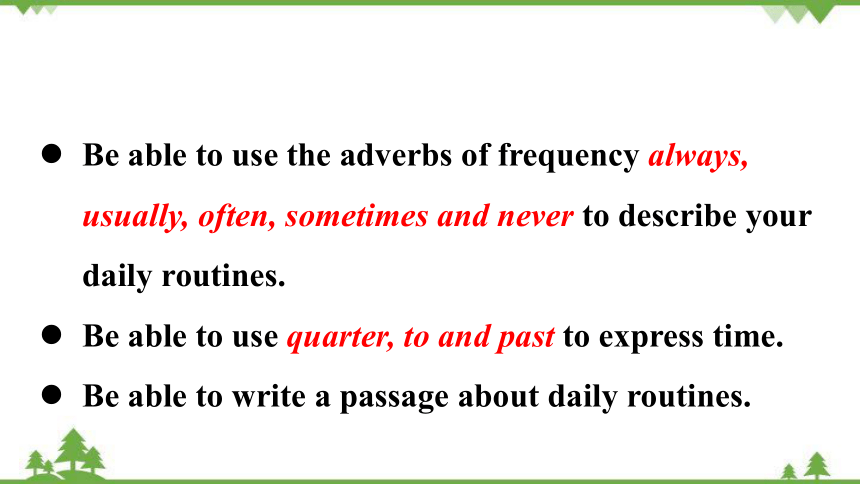
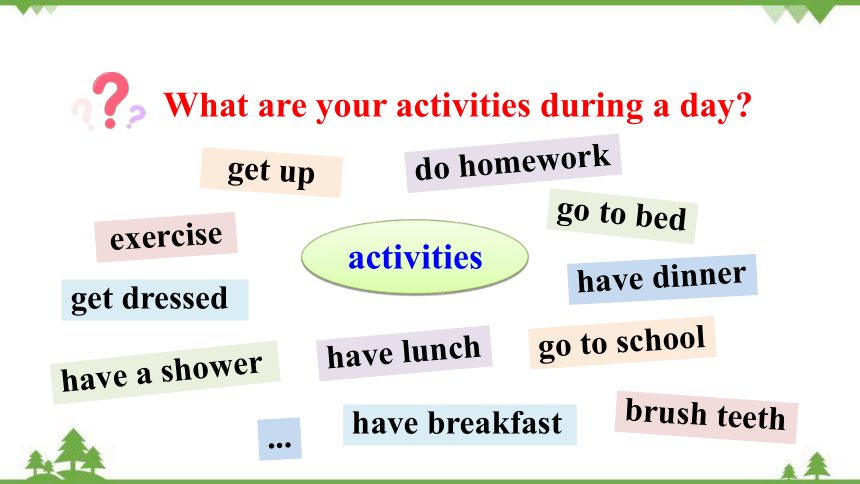

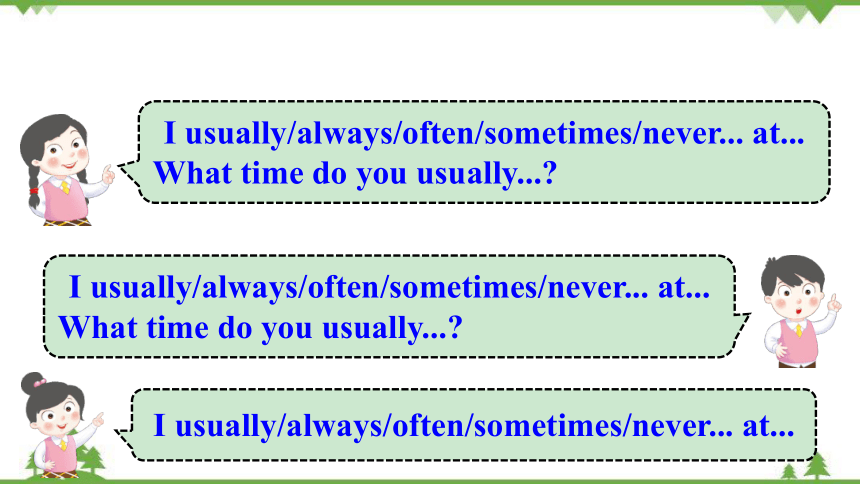
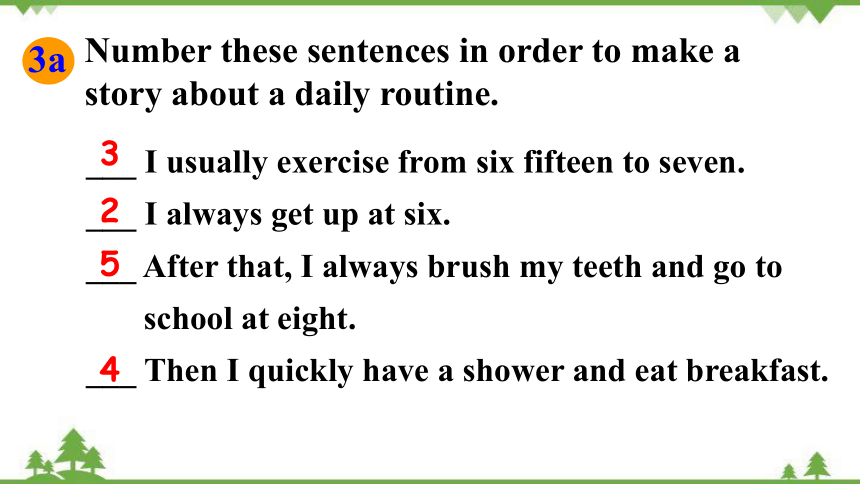
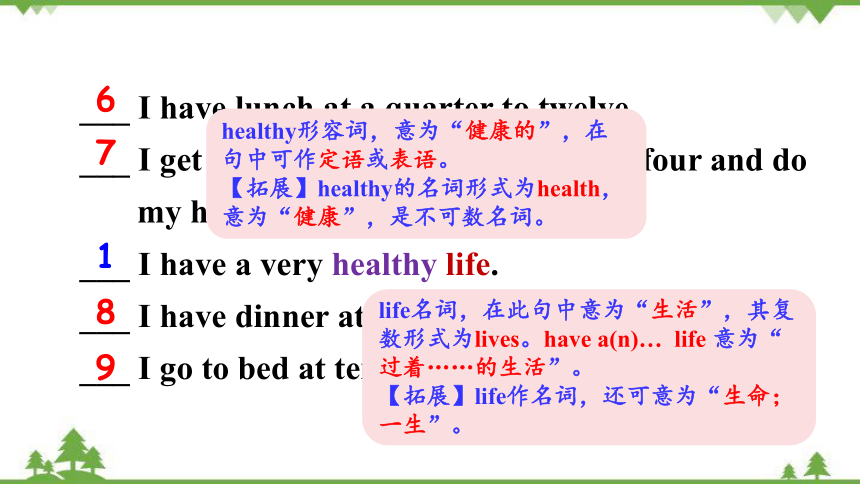
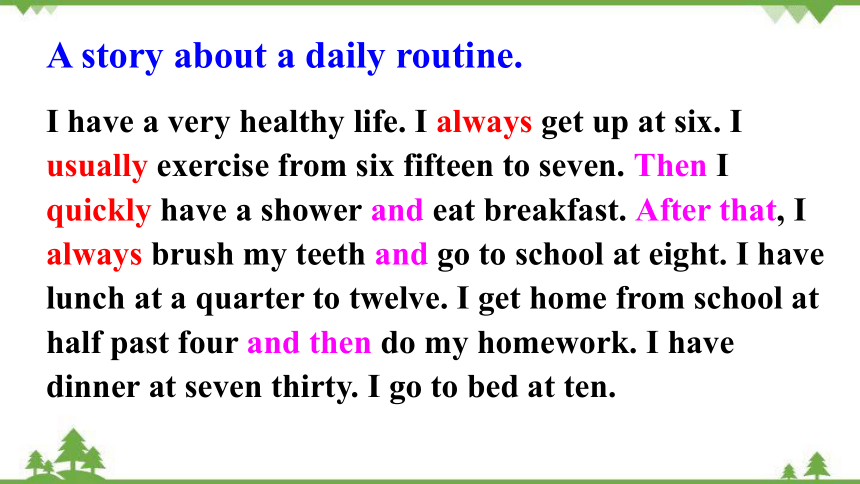
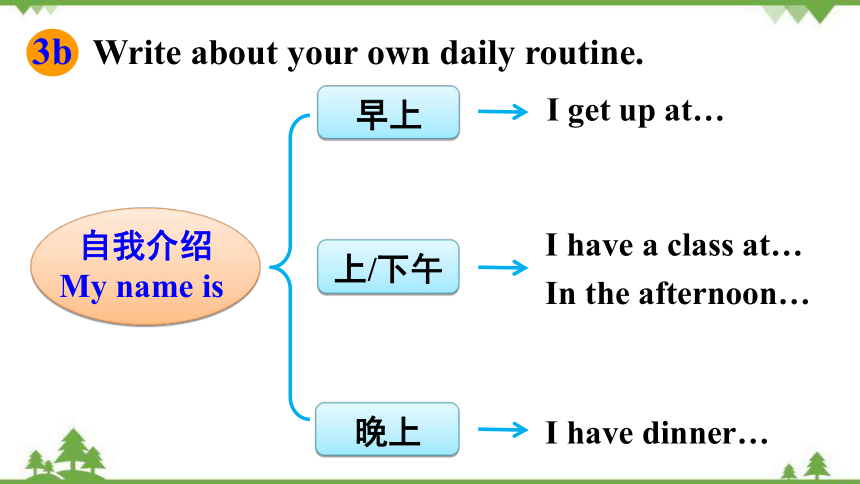
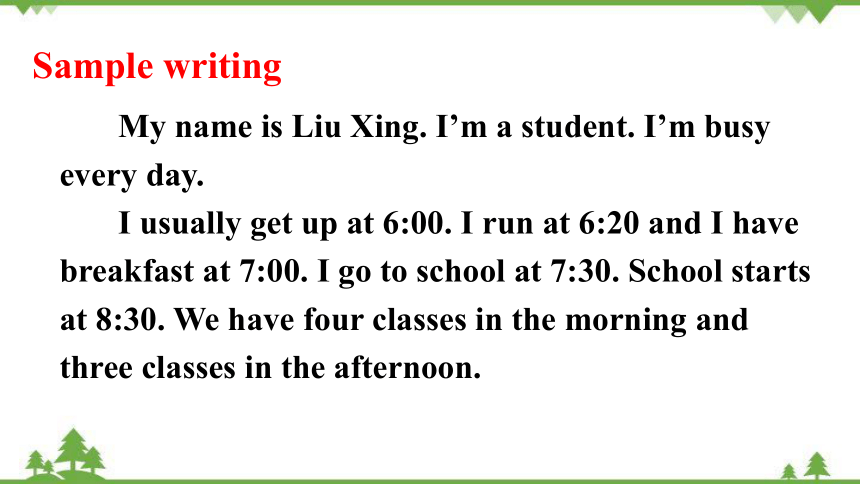
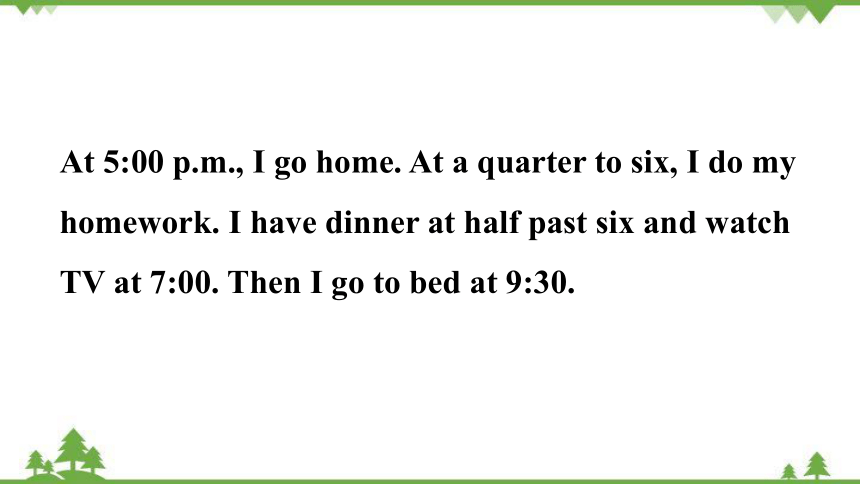
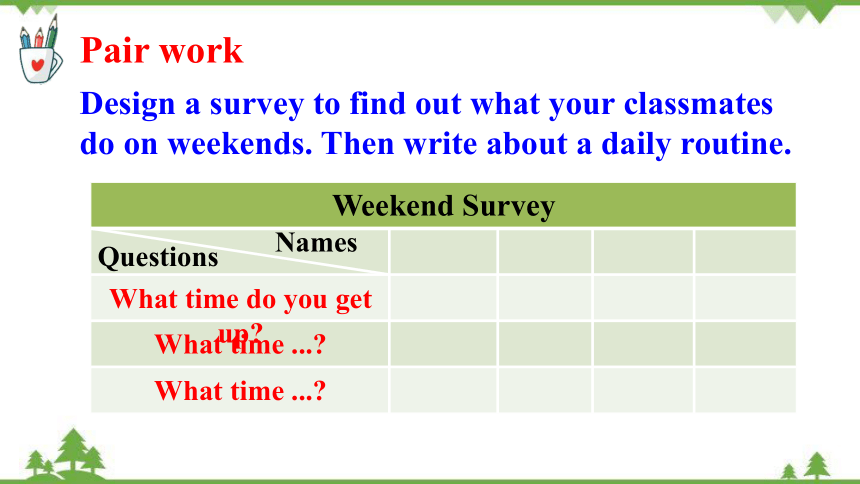
文档简介
(共31张PPT)
Unit 2 What time
do you go to school
Section B 3a-Self Check
Be able to use the adverbs of frequency always, usually, often, sometimes and never to describe your daily routines.
Be able to use quarter, to and past to express time.
Be able to write a passage about daily routines.
Learning objects
Brainstorm
get up
go to bed
have lunch
exercise
have dinner
have a shower
get dressed
go to school
brush teeth
What are your activities during a day
do homework
have breakfast
activities
...
What time do you usually do these things
I usually/always/often/sometimes/never... at...
Let’s say
Game: 句子接龙
I usually/always/often/sometimes/never... at...
What time do you usually...
I usually/always/often/sometimes/never... at...
What time do you usually...
I usually/always/often/sometimes/never... at...
3a
Number these sentences in order to make a story about a daily routine.
___ I usually exercise from six fifteen to seven.
___ I always get up at six.
___ After that, I always brush my teeth and go to school at eight.
___ Then I quickly have a shower and eat breakfast.
3
2
5
4
___ I have lunch at a quarter to twelve.
___ I get home from school at half past four and do my homework.
___ I have a very healthy life.
___ I have dinner at seven thirty.
___ I go to bed at ten.
6
7
1
8
9
life名词,在此句中意为“生活”,其复数形式为lives。have a(n)… life 意为“过着……的生活”。
【拓展】life作名词,还可意为“生命;一生”。
healthy形容词,意为“健康的”,在句中可作定语或表语。
【拓展】healthy的名词形式为health,意为“健康”,是不可数名词。
I have a very healthy life. I always get up at six. I usually exercise from six fifteen to seven. Then I quickly have a shower and eat breakfast. After that, I always brush my teeth and go to school at eight. I have lunch at a quarter to twelve. I get home from school at half past four and then do my homework. I have dinner at seven thirty. I go to bed at ten.
A story about a daily routine.
3b
Write about your own daily routine.
自我介绍
My name is
I get up at…
I have a class at…
In the afternoon…
I have dinner…
早上
上/下午
晚上
My name is Liu Xing. I’m a student. I’m busy every day.
I usually get up at 6:00. I run at 6:20 and I have breakfast at 7:00. I go to school at 7:30. School starts at 8:30. We have four classes in the morning and three classes in the afternoon.
Sample writing
At 5:00 p.m., I go home. At a quarter to six, I do my homework. I have dinner at half past six and watch TV at 7:00. Then I go to bed at 9:30.
Pair work
Design a survey to find out what your classmates do on weekends. Then write about a daily routine.
Weekend Survey
Names
Questions
What time do you get up
What time ...
What time ...
本单元以“日常作息习惯”为话题,写作时,要求学生能正确运用一般现在时,能正确表达时间和使用never, sometimes, often, usually, always等频度副词来谈论自己或他人的日常生活。
话题概述
经典例题
一、审题立意
假如你是李华,你远在美国的叔叔发来邮件询问你爷爷的日常生活。请根据下表内容用英文回复一封电子邮件,向叔叔介绍你爷爷的一天。
时态:一般现在时
体裁:应用文
人称:第三人称
上午 早起买菜做早饭,十点到十一点和朋友们下国际象棋。
下午 十二点十五分吃午饭,饭后看书或者拉二胡。
晚上 晚饭后散步一小时,九点半上床睡觉。
要求:1. 语句通顺,意思连贯,包括所有提示内容, 可自由发挥;
2. 60词左右(开头和结尾已给出,不计入总词数)。
参考词汇:worry about 担心; read 阅读
要点
Dear Uncle,
Don’t worry about Grandpa. I’ll tell you his living habits. ____________________________________
__________________________________________
__________________________________________
Yours,
Li Hua
二、谋篇布局
开篇点题
I’ll tell you his living habits.
叙述一天的活动
表达感想
In the morning, he gets up early to…
From… to…, Grandpa likes to…
He always has lunch at…
After lunch, he either… or…
In the evening, Grandpa usually…
I think he has a healthy life.
起床 ___________________
穿上衣服 ___________________
洗淋浴 ___________________
(在)周末 ___________________
做作业 ___________________
去上班 ___________________
散步 ___________________
get up
get dressed
take a shower
on weekends
do (one’s) homework
go to work
三、积句成篇
短语储备
take a walk
吃午饭 ________________
到家 ________________
上床睡觉 ________________
健康生活 ________________
对……有益 ________________
大量;许多 ________________
要么……要么……; ________________
或者……或者……
have lunch
get home
go to bed
短语储备
healthy life
be good for
lots of
either… or…
Do you want to know about... living habits
I’ll tell you his living habits.
In the morning, he usually… at…
From… to…, he likes to…
After lunch, he either… or…
He usually… in the evening.
I think he has healthy living habits.
… have/has a healthy life.
It’s never too old to learn.
Time and tide wait for no man.
开头句
中间句
结尾句
经典名句
句型荟萃
范文欣赏
Dear Uncle, Don’t worry about Grandpa. I’ll tell you his living
habits. In the morning, he gets up early to buy vegetables and make breakfast. From ten o’clock to
eleven o’clock. Grandpa likes to play chess with
his friends. You know, Grandpa is good at it.
He always has lunch at a quarter past twelve. After lunch, he either reads books or plays the erhu. In the evening, Grandpa usually takes a walk for an hour after dinner and goes to bed at nine thirty. I think he has a healthy life.
Yours, Li Hua
Self check
1. Match the verbs in column A with the words in column B. Then use the phrases to complete the sentences.
A
taste
clean
have
get
take
brush
B
your teeth
my room
a walk
good
dressed
a good job
taste good
clean my room
have a good job
get dressed
take a walk
brush your teeth
尝起来不错
打扫我的房间
有一份好工作
穿上衣服
散步
刷你的牙
1. Ice-cream usually ____________ so students like
to eat it after school.
2. My grandparents are very healthy. They always
____________ after dinner.
3. You need to _______________ after eating to
have good teeth.
brush your teeth
tastes good
take a walk
4. He _____________. He works at a radio station.
5. Here are your clothes. Go and ____________ quickly!
6. I don’t have time to ______________ from Monday to Friday. So I clean it on weekends.
get dressed
clean my room
has a good job
本句是一个由here引导的倒装句,正常语序为“Your clothes are here.”。当副词here, there等位于句首且主语为名词时,主语和谓语要倒装,即“Here/There+谓语动词+主语(名词).”,其中谓语的单复数形式视后面的主语而定。
2. Complete the conversations with questions and
answers. Use the words in brackets to help you.
1.A._______________________________________
(your mother/usually/get up)
B. _______________________________________.
(5:45)
What time does your mother usually get up
She usually gets up at 5:45 in the morning
A:_________________________________________
(why/get up/so early )
B:_________________________________________.
(always/make breakfast for me)
Why does she get up so early
Because she always makes breakfast for me
2. A.________________________________________
(you/usually/get to school)
B. ________________________________________.
(7:30)
What time do you usually get to school
I usually get to school at 7:30 in the morning
A:________________________________________
________________________________________
(your class teacher/usually/get to school)
B: I don’t know. But he/she is never late for the first
class in the morning.
What time does your class teacher usually
get to school
Summary
Tip 1: 要根据时间顺序来描述自己日常的习惯。
Tip 2: 能够适当的使用频率副词: usually, always…
Tip 3: 能够使用恰当的连词及其短语,如:
then, after that, so, but…
Writing tips about My daily routines
Unit 2 What time
do you go to school
Section B 3a-Self Check
Be able to use the adverbs of frequency always, usually, often, sometimes and never to describe your daily routines.
Be able to use quarter, to and past to express time.
Be able to write a passage about daily routines.
Learning objects
Brainstorm
get up
go to bed
have lunch
exercise
have dinner
have a shower
get dressed
go to school
brush teeth
What are your activities during a day
do homework
have breakfast
activities
...
What time do you usually do these things
I usually/always/often/sometimes/never... at...
Let’s say
Game: 句子接龙
I usually/always/often/sometimes/never... at...
What time do you usually...
I usually/always/often/sometimes/never... at...
What time do you usually...
I usually/always/often/sometimes/never... at...
3a
Number these sentences in order to make a story about a daily routine.
___ I usually exercise from six fifteen to seven.
___ I always get up at six.
___ After that, I always brush my teeth and go to school at eight.
___ Then I quickly have a shower and eat breakfast.
3
2
5
4
___ I have lunch at a quarter to twelve.
___ I get home from school at half past four and do my homework.
___ I have a very healthy life.
___ I have dinner at seven thirty.
___ I go to bed at ten.
6
7
1
8
9
life名词,在此句中意为“生活”,其复数形式为lives。have a(n)… life 意为“过着……的生活”。
【拓展】life作名词,还可意为“生命;一生”。
healthy形容词,意为“健康的”,在句中可作定语或表语。
【拓展】healthy的名词形式为health,意为“健康”,是不可数名词。
I have a very healthy life. I always get up at six. I usually exercise from six fifteen to seven. Then I quickly have a shower and eat breakfast. After that, I always brush my teeth and go to school at eight. I have lunch at a quarter to twelve. I get home from school at half past four and then do my homework. I have dinner at seven thirty. I go to bed at ten.
A story about a daily routine.
3b
Write about your own daily routine.
自我介绍
My name is
I get up at…
I have a class at…
In the afternoon…
I have dinner…
早上
上/下午
晚上
My name is Liu Xing. I’m a student. I’m busy every day.
I usually get up at 6:00. I run at 6:20 and I have breakfast at 7:00. I go to school at 7:30. School starts at 8:30. We have four classes in the morning and three classes in the afternoon.
Sample writing
At 5:00 p.m., I go home. At a quarter to six, I do my homework. I have dinner at half past six and watch TV at 7:00. Then I go to bed at 9:30.
Pair work
Design a survey to find out what your classmates do on weekends. Then write about a daily routine.
Weekend Survey
Names
Questions
What time do you get up
What time ...
What time ...
本单元以“日常作息习惯”为话题,写作时,要求学生能正确运用一般现在时,能正确表达时间和使用never, sometimes, often, usually, always等频度副词来谈论自己或他人的日常生活。
话题概述
经典例题
一、审题立意
假如你是李华,你远在美国的叔叔发来邮件询问你爷爷的日常生活。请根据下表内容用英文回复一封电子邮件,向叔叔介绍你爷爷的一天。
时态:一般现在时
体裁:应用文
人称:第三人称
上午 早起买菜做早饭,十点到十一点和朋友们下国际象棋。
下午 十二点十五分吃午饭,饭后看书或者拉二胡。
晚上 晚饭后散步一小时,九点半上床睡觉。
要求:1. 语句通顺,意思连贯,包括所有提示内容, 可自由发挥;
2. 60词左右(开头和结尾已给出,不计入总词数)。
参考词汇:worry about 担心; read 阅读
要点
Dear Uncle,
Don’t worry about Grandpa. I’ll tell you his living habits. ____________________________________
__________________________________________
__________________________________________
Yours,
Li Hua
二、谋篇布局
开篇点题
I’ll tell you his living habits.
叙述一天的活动
表达感想
In the morning, he gets up early to…
From… to…, Grandpa likes to…
He always has lunch at…
After lunch, he either… or…
In the evening, Grandpa usually…
I think he has a healthy life.
起床 ___________________
穿上衣服 ___________________
洗淋浴 ___________________
(在)周末 ___________________
做作业 ___________________
去上班 ___________________
散步 ___________________
get up
get dressed
take a shower
on weekends
do (one’s) homework
go to work
三、积句成篇
短语储备
take a walk
吃午饭 ________________
到家 ________________
上床睡觉 ________________
健康生活 ________________
对……有益 ________________
大量;许多 ________________
要么……要么……; ________________
或者……或者……
have lunch
get home
go to bed
短语储备
healthy life
be good for
lots of
either… or…
Do you want to know about... living habits
I’ll tell you his living habits.
In the morning, he usually… at…
From… to…, he likes to…
After lunch, he either… or…
He usually… in the evening.
I think he has healthy living habits.
… have/has a healthy life.
It’s never too old to learn.
Time and tide wait for no man.
开头句
中间句
结尾句
经典名句
句型荟萃
范文欣赏
Dear Uncle, Don’t worry about Grandpa. I’ll tell you his living
habits. In the morning, he gets up early to buy vegetables and make breakfast. From ten o’clock to
eleven o’clock. Grandpa likes to play chess with
his friends. You know, Grandpa is good at it.
He always has lunch at a quarter past twelve. After lunch, he either reads books or plays the erhu. In the evening, Grandpa usually takes a walk for an hour after dinner and goes to bed at nine thirty. I think he has a healthy life.
Yours, Li Hua
Self check
1. Match the verbs in column A with the words in column B. Then use the phrases to complete the sentences.
A
taste
clean
have
get
take
brush
B
your teeth
my room
a walk
good
dressed
a good job
taste good
clean my room
have a good job
get dressed
take a walk
brush your teeth
尝起来不错
打扫我的房间
有一份好工作
穿上衣服
散步
刷你的牙
1. Ice-cream usually ____________ so students like
to eat it after school.
2. My grandparents are very healthy. They always
____________ after dinner.
3. You need to _______________ after eating to
have good teeth.
brush your teeth
tastes good
take a walk
4. He _____________. He works at a radio station.
5. Here are your clothes. Go and ____________ quickly!
6. I don’t have time to ______________ from Monday to Friday. So I clean it on weekends.
get dressed
clean my room
has a good job
本句是一个由here引导的倒装句,正常语序为“Your clothes are here.”。当副词here, there等位于句首且主语为名词时,主语和谓语要倒装,即“Here/There+谓语动词+主语(名词).”,其中谓语的单复数形式视后面的主语而定。
2. Complete the conversations with questions and
answers. Use the words in brackets to help you.
1.A._______________________________________
(your mother/usually/get up)
B. _______________________________________.
(5:45)
What time does your mother usually get up
She usually gets up at 5:45 in the morning
A:_________________________________________
(why/get up/so early )
B:_________________________________________.
(always/make breakfast for me)
Why does she get up so early
Because she always makes breakfast for me
2. A.________________________________________
(you/usually/get to school)
B. ________________________________________.
(7:30)
What time do you usually get to school
I usually get to school at 7:30 in the morning
A:________________________________________
________________________________________
(your class teacher/usually/get to school)
B: I don’t know. But he/she is never late for the first
class in the morning.
What time does your class teacher usually
get to school
Summary
Tip 1: 要根据时间顺序来描述自己日常的习惯。
Tip 2: 能够适当的使用频率副词: usually, always…
Tip 3: 能够使用恰当的连词及其短语,如:
then, after that, so, but…
Writing tips about My daily routines
同课章节目录
- Unit 1 Can you play the guitar?
- Section A
- Section B
- Unit 2 What time do you go to school?
- Section A
- Section B
- Unit 3 How do you get to school?
- Section A
- Section B
- Unit 4 Don't eat in class.
- Section A
- Section B
- Unit 5 Why do you like pandas?
- Section A
- Section B
- Unit 6 I'm watching TV.
- Section A
- Section B
- Review of Units 1-6
- Unit 7 It's raining!
- Section A
- Section B
- Unit 8 Is there a post office near here?
- Section A
- Section B
- Unit 9 What does he look like?
- Section A
- Section B
- Unit 10 I'd like some noodles.
- Section A
- Section B
- Unit 11 How was your school trip?
- Section A
- Section B
- Unit 12 What did you do last weekend?
- Section A
- Section B
